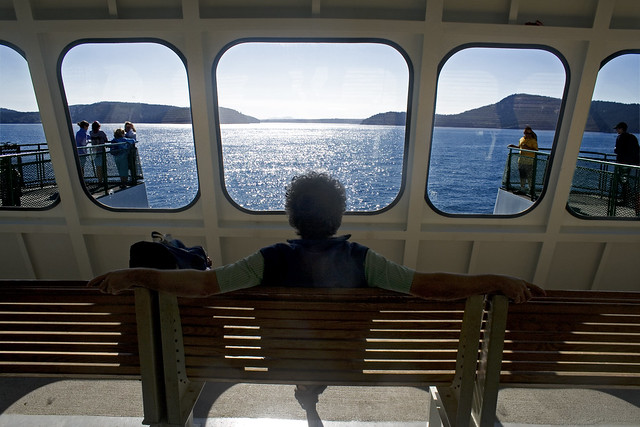I’m saddened to hear about people who would love to travel more but are concerned about the impact taking an extended trip might have on their careers. You know that saying about regrets — I’m not sure all these people will get to seventy and say “I really wish I’d got one extra promotion”, but I bet a heap of them will think “I wish I’d traveled more”.
Vagabondish is reader-supported. When you buy through links on our site, we may earn a small affiliate commission. Read our disclosure.
Life is too short to spend too much of it working. So to help persuade these trip-taking fence-sitters I’ve put together this list of reasons why travel is actually good for your resume.

Riding the Ferry, Washington State © woodleywonderworks
Travel Develops Your Interpersonal Skills
There is so, so much to learn from travel. If you’re traveling independently on a small budget, then there are numerous soft skills that are going to get a serious workout — probably more in a week on the road than they’d get in a whole year in a company. These include:
Communication
When you’re traveling, communication is almost equivalent to survival.
Suddenly, when you’re traveling, communicating is almost equivalent to survival! Being able to communicate with other people from different walks of life, cultures and languages is such an important skill in any work. When you’re traveling you practice this daily as you ask for directions, check in at a hostel or order a meal.
Negotiation
Bartering at a market, convincing a taxi driver to take you exactly where you want to go, talking your way out of a tricky situation: negotiating is a regular part of traveling life and it’s such a vital skill to develop.
I was a hopeless negotiator when it came to money before I went traveling. Now I’m able to stand up for myself (and my wallet). Employers will love this!
Cross-cultural Understanding
The world is getting smaller and nearly all jobs require you to work with people from different cultures. Living amongst these people as you travel abroad, talking with them and learning their stories and ways of life gives you a huge advantage at being able to deal with them successfully from a work point of view.
Self-sufficiency and Independence
For many of us, a long-term trip is the first time when we really have to rely on ourselves and don’t have anyone to call for back-up when things get tough. Whether you’re dealing with a medical emergency in a country where you don’t speak the language (or even just a toothache, in my case!), deciding how to deal with a cancelled flight or just simply determining where you’re actually going to head to next, recognizing and improving your capacity for self-reliance will prepare you for every part of your future.
Decision Making
When you’re traveling, you’re the boss. So you can’t just send a question “up the line” for a decision. Sometimes it’s the fun decision of which new kind of food to try, or a hard one like “should you take an expensive flight home for a relative’s funeral?”. Whatever the decisions are, you’ll be a lot better at making them after some extended traveling.

Travelers at Seattle Airport © Wonderlane
Travel Gives You Practical Skills
Depending on where you go and what you do, long term travelers tend to develop a range of other hands-on and practical skills as well.
In my case, I’ve become fluent in German and have a useful understanding of Japanese. I also spent several years teaching English to adults and children in various countries. It was the experience of teaching adults that helped land me some great consulting work once I settled back in at home.
There are plenty more skills you can acquire on the road: many travelers take part in volunteer programs and may learn skills in building, agriculture, teaching, personal care and more. You might also pick up other kinds of qualifications — first aid certificates and scuba diving spring to mind, or licenses to coach or lead outdoor activities. These too might prove handy tools for future employers.
In addition, the simple fact that you have proven yourself capable of getting to and around a foreign country can be attractive to an employer. If you’re applying for a job where travel is involved, your new boss will be pleased that you’ll be more than comfortable heading off to unusual places to do business. They will have confidence that you will be able to handle yourself appropriately.
You need only look at the numbers of would-be travelers who don’t survive their first week living abroad (I know a number of my colleagues teaching in Japan went home within the first month as they were too homesick) to realize that your ability to travel is truly an asset.
Do You Really Want an Employer Who Hates Travel?
Let me turn things around for a second. Say that you apply for a job and the employer actually would choose another candidate over you simply because you spent a year or two traveling while the other candidate was busy slaving away at their desk. Is this the kind of boss you want to work for? Won’t this be the sort of employer that doesn’t even allow you to take a week off for your honeymoon and you end up spending a honeymoon weekend in a nearby city instead of a honeymoon week in Vanuatu?
Traveling Might Become Your Career
And here’s my final word for those scared to put their career on hold while they go traveling the world: maybe your career will end up quite differently to what you’re planning!
Remember that although you’re sure now that you want to end up CEO of a major company or head of marketing at a fashion brand, things are always open to change and you may well discover alternatives while traveling. That might mean you come home and end up in a different career, or you might never come home at all!
Numerous people have headed off for a short trip and something’s happened to make them stay away — happily! — forever. So stop fretting about your resume and go book your ticket.


